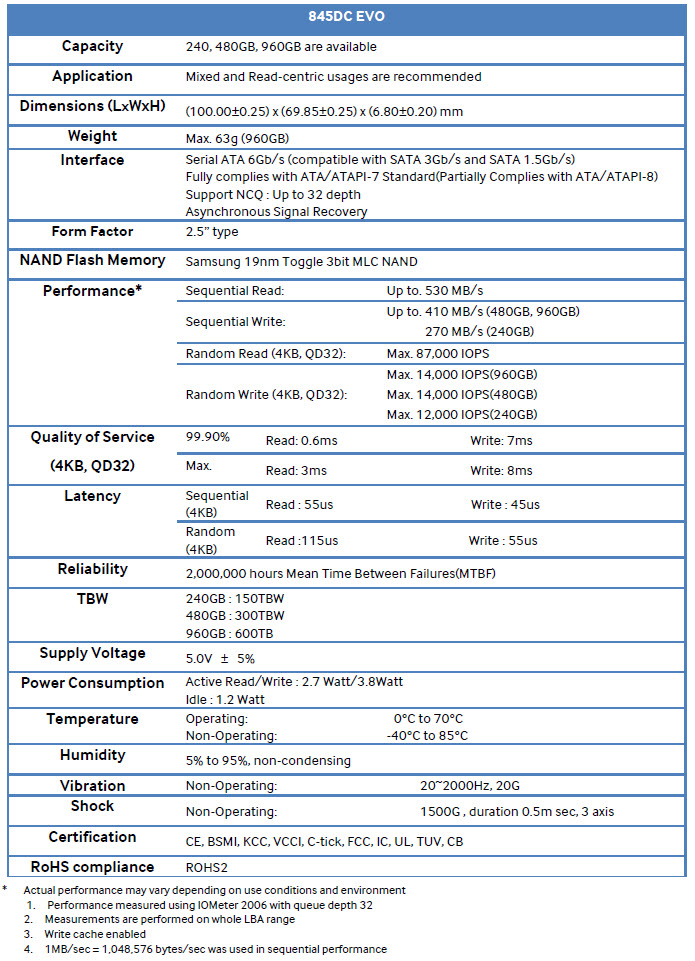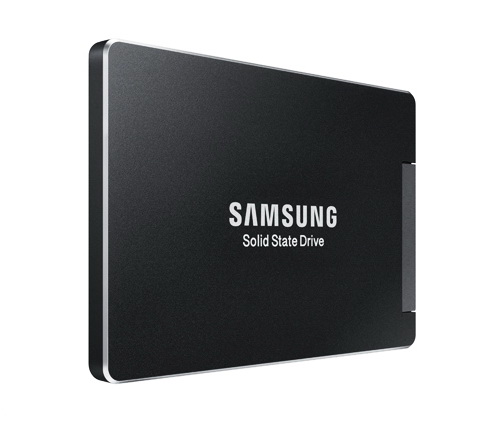INTRODUCTION
Although the price/capacity gap between normal HDDs and SSDs still holds i think that we've all witnessed the quite impressive price hits SSDs have taken during this past year and so it may actually be sooner than later that we'll see that gap become a lot smaller. Of course with the upcoming SATA Express standard next generation SSDs will almost certainly get a significant boost in read/write performance which will widen the performance gap between them and regular mechanical HDDs even further so no one can really tell how things will turn out in the somewhat immediate future. That being said it wasn't until a couple of months back that we finally managed to receive the 840 EVO SSD by Samsung and they've already released its successor the 845DC EVO the 240GB variant of which we have here with us today.
Samsung's Memory Business offers the industry's most advanced and extensive range of memory semiconductor products. As a leader in both the design and manufacture of memory semiconductor since 1993, the business provides key memory products including dynamic random access memory (DRAM), static random access memory (SRAM), NAND flash memory, Solid State Drives (SSD) and a range of green memory solutions for use in PC, server and mobile applications. Samsung is also leading the industry in advancements of next generation DRAM and NAND flash technologies while nurturing future memory technologies.
Samsung aims the latest 845DC EVO SSD not towards home and office use but for datacenters (thus the DC at the end) since thanks to its 19nm Toggle 3bit (TLC) MLC NAND flash, 2 million hours MTBF and 5 year warranty it should feel right at home when dealing with enterprise workloads. When Samsung started using TLC NAND flash with their solutions (for example the 840 EVO) the lower P/E cycle ratings (lower write endurance with higher latencies) disappointed some people who rushed to judge it but after a full year later I’ve yet to hear a single complaint about the 840 EVO so when they announced the TLC based 845DC EVO which is basically enterprise-grade material i was quite intrigued. Features-wise the 845DC EVO is basically an improved 840 EVO (uses the same MEX 3-Core ARM Cortex-R4 (400Mhz) controller) that comes ready with tantalum capacitors (power loss protection) which in the event of power loss should keep the drive powered long enough to save your data, advanced signal processing used for error correction and advanced data protection integrated into the enterprise workload optimized firmware. Of course we can't really test the endurance of the drive (we probably would be able to if we were to deliver this review in let's say a year from now) but we can test its performance and since the 840 EVO is already a very fast drive i wonder what the 845DC EVO is capable of.
SPECIFICATIONS AND FEATURES

PACKAGING AND CONTENTS
We received our sample of the 845DC EVO in a small cardboard box with just the company logo on a large sticker at the front (a small sticker identifying this as a review sample was also placed on the front sticker but it fell off).
The company logo is also placed on the left side of the box.
At the front where the sticker extends as well we see the connectivity type along with several certification and warning logos.
The sticker also has the official page URL which you should visit if you require more information on the product (it's listed in 7 languages).
Our box contained just the 845DC EVO SSD but the retail one should come with a more complete bundle.
THE 845DC EVO 240GB
Just like the 840 EVO the 845DC EVO is an 2.5" 7mm thick SSD and carries the company name at the top.
As usual on the large sticker at the rear you will find information such as the drives serial and part numbers, barcodes, electrical specifications, factory rollout date, drive connectivity and several certification and warning logos.
Moving at the rear as expected we find the usual SATA power and data connectors.
The 240GB variant comes with a total of four 19nm 3-bit per cell MLC (TLC) Toggle NAND flash packages placed on one side of the PCB.
Although on the other side we see room for 4 more NAND flash packages the 240GB variant just has the controller, 512MB LPDDR2-1066 DRAM buffer chip and finally the Tantalum capacitors.
As mentioned earlier in this review the MEX 3-Core ARM Cortex-R4 8-channel controller runs at 400MHz and is virtually the same as the one used in the 840 EVO.
TEST BED


TESTING METHODOLOGY
After roughly 6 years of testing sold state drives i have concluded that it's almost impossible for any single benchmark suite to accurately measure their performance and that's why in certain benchmark suites we see amazing read/write performance numbers with some drives while in others things are quite different. The reason behind this is that some benchmarking suites are configured to read and write random chunks of data while others read and write constant (sequential) ones. So that's why i always use a very wide selection of benchmarking suites including AIDA64, HD Tach RW, HD Tune Pro, Crystal Disk Mark, Sisoftware Sandra Pro, AS SSD, IOmeter and ATTO. To get the most accurate results each test gets repeated a total of 6 times with the average performance numbers recorded into our charts.
Many people made inquiries about the charts ever since the last comparison so once again please do keep in mind that the Charts have the average performance numbers of each drive recorded and not the peak (highest) ones. Also although every single one of these programs can help potential buyers choose the right drive for their needs you should also remember that from any kind of benchmark up to real world usage the gap is not small (and usually most differences will go unnoticed by most people). All tests were performed in a fresh Windows 7 Ultimate x64 installation with every update installed up to July 1st 2014.
TEST RESULTS - AIDA64 / ATTO


TEST RESULTS - HD TUNE PRO / HD TACH RW


TEST RESULTS - SISOFTWARE SANDRA PRO / CRYSTAL DISK MARK


TEST RESULTS - AS SSD / IOMETER


CONCLUSION
When Samsung announced to us that they were going to release the 845DC EVO for datacenter applications (enterprise-grade) i was quite intrigued since i knew that it was an improved version of the consumer oriented 840 EVO model which i have to say performed very well for its price tag. Still after wrapping up all tests i can't say that i was impressed with its write performance when compared to the write performance of the 840 EVO. Sure the 845DC EVO is optimized for heavy workloads which our tests may not be able to simulate with 100% accuracy and it does offer power loss protection via an array of tantalum capacitors but i really expected it to perform if not better at least the same as the 840 EVO in write performance (especially since we tested both drives at virtually the same capacity). The good news is that higher capacity models perform roughly 40% better (always according to official specs) so for those this isn't really an issue but it undoubtedly is for the 240GB model which we had the chance to test. As for all those 3bit NAND longevity concerns consumers and enterprise users may have Samsung addressed them with a longer warranty period of 5 years although we really won't know how entering the enterprise market with TLC based SSDs will turn out for at least a couple of years.
Since the 845DC EVO is a brand new product availability is almost zero at this point but Samsung has announced an recommended price tag of USD249.99 for the 240GB model which although not bad for an enterprise-grade SSD still it may be just a tad too much for an improved 840 EVO or at least that's how some people will see it. Of course just the power loss protection alone is worth the extra premium but the real problem with the 240GB model is its write performance and that reason alone i expect will be enough to make people turn either to the higher capacity models or to other alternatives. Overall Samsung has done it again and although the 845DC EVO 240GB will not be winning any performance crowns anytime soon (its higher capacity brothers may) its enterprise-grade features coupled with the 5 year warranty, and the support only Samsung can offer make it a very solid enterprise-grade solution well worth our Golden Award.
 PROS
PROS
- Build Quality (2 Million Hours MTBF)
- Excellent Read Performance
- Power Loss Protection
- Firmware Optimized For Heavy Enterprise Workloads
- 5 Year Warranty
- Available In 960GB
- Price (For Some)
CONS
- Write Performance (240GB Model Only)
- TLC NAND Durability? (Remains To Be Seen)

 O-Sense
O-Sense




















.png)

